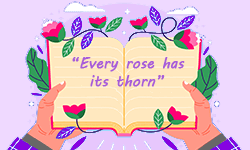
Many may know the saying “every rose has its thorn” from the eponymous rock ballad by “Poison.” However, it conveys a powerful message about the dual nature of beauty and adversity. Just as a rose, with all its beauty, is accompanied by sharp thorns, life too presents challenges alongside its blessings. This proverb reminds us that even the most positive experiences or people may come with difficulties or imperfections.
Definition: “Every rose has its thorn”
The core meaning of the proverb “every rose has its thorn” is that beauty and goodness often come with challenges or difficulties. It reflects that nothing is perfect; even the most beautiful or desirable things in life have downsides or struggles. The saying serves as a reminder to approach life with balance and realistic expectations, understanding that joy, pain, beauty, and hardship are frequently intertwined.
The following examples will illustrate the underlying meaning of the proverb and describe exemplary situations that can be applied to “every rose has its thorn.”
These examples depict different real-life situations where the proverb applies, showing that even positive experiences come with challenges.
It should be noted that when saying “every rose has its thorn,” people don’t literally mean roses and thorns. The proverb is a metaphor, so used symbolically to convey deeper life lessons.
Explanation of the visual meaning
The visual representation of the proverb “every rose has its thorn” symbolizes the idea that beauty and positivity are often accompanied by difficulties or challenges. The rose represents something beautiful, desirable, or positive, while the thorns symbolize the inevitable hardships or obstacles that come with it. It serves as a reminder that even one of the most beautiful and cherished flowers can cause pain.
This four-panel comic illustrates the progression of a woman’s promotion and the resulting workload. In the first panel, the woman receives a job promotion, smiling and celebrating with her coworkers. She is praised and given a congratulatory gift by her supervisors. The woman begins to show signs of stress in the third panel. In the last panel, we see that the woman is completely overworked and stressed, with her buried in a massive paper stack, symbolizing the overwhelming workload following the promotion.
The visual conveys the balance between joy and pain, reward and risk, or success and struggle. It highlights that even the most beautiful or valuable things in life are not without their flaws or difficulties. It reminds us to accept the good and the bad, understanding that they are interconnected.

How to use it
The proverb “every rose has its thorn” can be used in various contexts to express the idea that even positive or beautiful things come with challenges. Here’s how it applies in different settings.
In personal relationships, the proverb highlights that even the most loving relationships come with difficulties or disagreements.
Regarding self-improvement, the proverb reflects how achieving personal goals often requires enduring hardships or struggles.
In religious or spiritual contexts, the proverb can reflect the idea that spiritual enlightenment or a relationship with a higher power may involve trials or sacrifices.
The proverb is also relevant when discussing success, emphasizing that the pursuit of achievement often brings challenges or sacrifices along with rewards.
In a work environment, the proverb emphasizes that professional success often comes with stress, hard work, or difficult decisions.
Origin and history
Are you ready for a history lesson on the symbolism behind “every rose has its thorn”? Well, then read on and find out where the proverb has its origin, as well as its symbolism in different countries and religions.
Ancient symbolism
The rose has been a symbol of beauty and love for thousands of years. In Ancient Greece and Rome, the rose was associated with gods and goddesses of love, such as Aphrodite and Venus. Nonetheless, the presence of thorns adds to the complexity of this symbol, implying that love and beauty can also result in hardship or peril.
Medieval Christian symbolism
In Christian tradition, the rose has been used to symbolize both the Virgin Mary and Christ’s suffering. The juxtaposition of the rose (beauty and purity) with its thorns (suffering and sacrifice) represented Christ’s crown of thorns, a symbol of human suffering and the ultimate sacrifice. Thus, the rose with thorns reflects the coexistence of beauty and pain in the human experience.
Literary and artistic use
Throughout literature and art, roses with thorns have been used to represent the bittersweet nature of life, where beauty and hardship go hand in hand. Poets and writers often use this imagery to explore themes of love, betrayal, and personal growth.
But what is the origin of the proverb? There’s no definitive answer to that question. It is believed to have originated as an Italian, French, or Dutch proverb. A comparable proverb, thought to originate from Persia, states: “He who wants a rose must respect the thorn.”
Similar proverbs and synonyms
Here is a collection of comparable proverbs and synonyms that emphasize the concept of duality. Below are a few of the most commonly recognised examples:
- He who wants a rose must respect the thorn. (Persian proverb)
- No pain, no gain.
- There is no sweet without sweat.
- You can’t have a rainbow without the rain.
- Every light has its shadow.
- Every cloud has a silver lining,
- No rose without a thorn. (French proverb)
- The bitter comes with the sweet.
- Bittersweet
- Imperfection
- Trade-off
- Contrast
- Inseparable
- Paradox
- Contradiction
- Juxtaposition
- Balance
FAQs
It means that even the most beautiful or positive things come with challenges or difficulties.
The saying “every rose has its thorn” highlights the idea that beauty is often accompanied by hardships or imperfections.
Yes, it is a metaphor that compares the rose (beauty) and its thorn (challenges) to the dual nature of life’s experiences.
Another way of saying “every rose has its thorn” is “nothing good comes without a price.”
You can find similar proverbs in the list in this article.
- ✓ Free express delivery
- ✓ Individual embossing
- ✓ Selection of high-quality bindings
